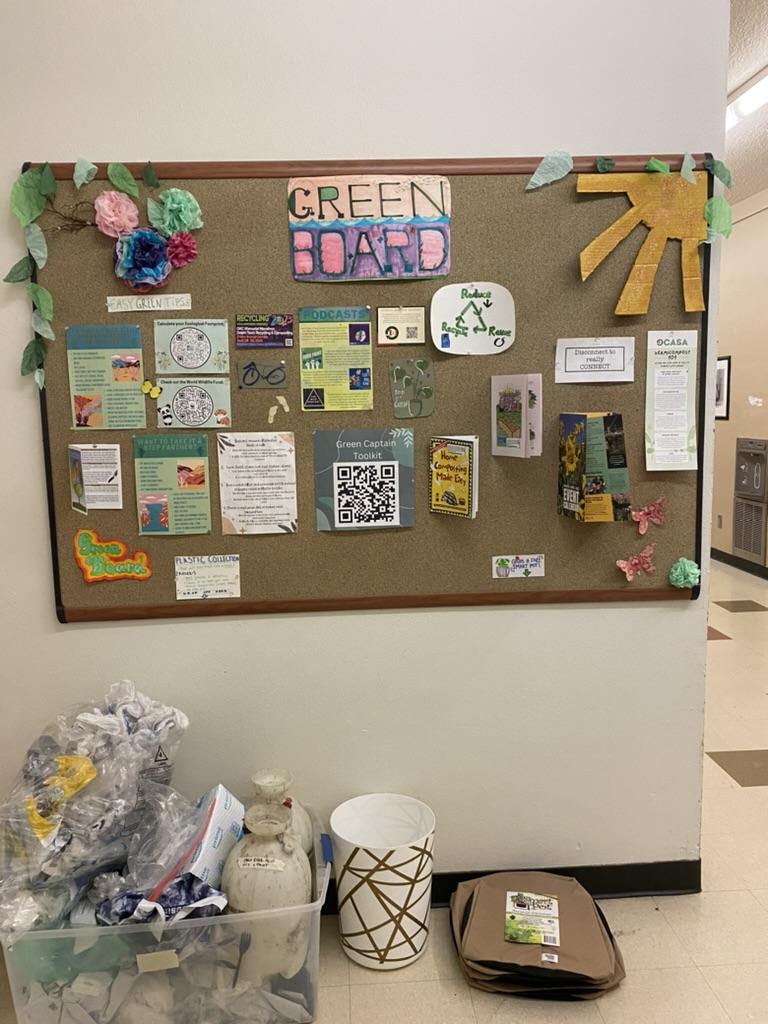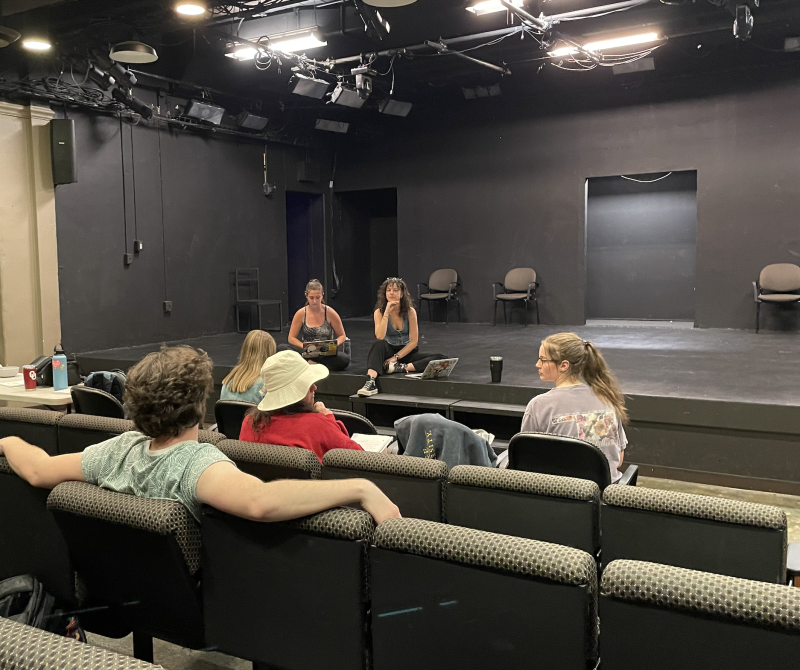Interview: Broadway Green Alliance College Green Captain Award Winner Emory Otto Talks Sustainability in Education
The College Green Captain Program supports college theatre students and faculty who are passionate about implementing eco-friendly practices within their departments.

The Broadway Green Alliance (BGA) recently announced Emory Otto as the winner of its annual College Green Captain Award. A student at the University of Oklahoma, Otto launched sustainable projects across various theatrical productions, created a sustainable toolkit and bulletin board for the university, and established a Green Representative role in the theatre department.
The Broadway Green Alliance College Green Captain Program supports students and faculty at the collegiate level who are passionate about implementing eco-friendly practices within their theatre departments. College Green Captains are provided with resources and coaching from the BGA to assist them in producing and designing theatre in a way that reduces their environmental footprint.
There are currently 97 colleges and universities participating in the College Green Captain Program. The Green Captain program extends beyond academic theatre and supports over 1,234 current and former Green Captains on Broadway, Touring Broadway, Off-Broadway, and in regional theatres across the country.
The BGA launched the College Green Captain Award to recognize and honor students for their sustainable efforts. Past recipients have led innovative, widely-applied, and long-term greening practices at their campuses including energy-efficient lighting, rechargeable batteries, recycling, composting, digital scripts/scores, and more. This year’s College Green Captain Award winner will receive two tickets to a Broadway production, in New York or on the road, and a virtual meet and greet with a Broadway Green Captain.
We sat down with Emory to discuss receiving this award, the sustainability efforts implemented within her department, and her hopes for greener college programs in the future.
Congratulations on your win! How does it feel to receive this honor?
It honestly makes me so excited! It's so rewarding for me to put my university’s program on the map in such a forward-thinking way and encourage people at other programs throughout the United States that if we can do it in Oklahoma, you can do it anywhere. To receive affirmation from Broadway is receiving affirmation that what we are doing here has a real impact and a real future. What we completed this year should not end after one or two years once those students who started it leave, and I hope the students and faculty in my program can see the way the industry is moving and be the frontrunners in making these sustainable changes the new normal. As artists today, we are only now realizing that we are part of an industry that is taking a stand against irreversible ecological damage, and it is time for us to explore what our art can do to spark these urgent conversations.
Can you talk about the sustainability efforts you implemented in your program that lead to this award?
My advisor Renée Brode and I created an OU Green Captain Toolkit which serves as a living document for Green Captains on productions. This document lays out what it means to create more sustainable theatre, mandatory goals to take on throughout the production, and ideas for other goals or initiatives to try out. The Green Captain is elected by the cast and crew after volunteering or being nominated in a process similar to an equity officer. Some duties they take on as Captains are setting up a Green Station where cast members can place their water bottles, recycle, and toss waste, and check out the zero-days-of-waste calendar. Some of the suggested roles the Captain can take on are bringing in a green fact every rehearsal, implementing a goal tailored to their certain production, or going paperless, among other goals. At the end of the production, the Green Captain sets up a Green Captain Display that highlights the work the cast and crew did in the production as well as a Green Captain Note connecting the importance of sustainability within the show.
The beauty of this role is that it keeps the conversation of sustainability in the room at all times; It creates a leadership role for students who are passionate and creates a learning opportunity for those who may not know what it means to live sustainably. It was also important to us as the writers of the toolkit that the Captain knows it's a living document meaning it can change, adapt, and tailor itself depending on the person and the production. The toolkit also emphasizes that the Green Captain is not alone in their duties but should be supported and uplifted by the rest of their cast and crew. Additionally, at the University of Oklahoma, we created the role of Green Representative which is supposed to be a volunteer from each year who takes note of impacts made on the day-to-day life in the department and discusses possible changes to make to improve those impacts.
Another initiative we took on this past year was the Green Board which showcases pamphlets on sustainable living and green organizations, upcoming environmental events, as well as art and graphics made by Fine Arts Students about the importance of sustainability. We also started a plastic donation drive through a Texas company called Bags to Benches that turns the plastic film into a bench on OU’s campus. This past year we did this alongside Green Week, which is an environmental group on campus, but I hope that our department will do our own drive this upcoming year.

How did the students and faculty respond to these changes?
Overall, the students and faculty were very supportive! Many of these directors welcomed the role of Green Captain with open arms and wanted to assist in any way they could. I participated in multiple productions outside of the main season and many of the companies I was working with wanted to take the role on even without me bringing it up (shoutout SCAB)! And in every production where a Green Captain was involved, the cast genuinely cared about staying on track with the days of waste and staying committed to their production’s goals.
My partner, Ella Partanen, and I also had a lot of help putting together the Green Board as a couple of people in the department came over to my house and made signs, posters, and 3D art with me to go on the board! Even on a day-to-day, I had multiple students come up to me asking what kind of plastic could be donated and what a Green Captain was. The conversation throughout the department was bustling and there was even interest in other Fine Arts departments to create their own Green Captain role.
What kind of support have you gotten from the Broadway Green Alliance during your time in the program?
My mentor/advisor Renée Brode I think received more personal communication and assistance from the BGA this past year which was very valuable in getting some of our Green Captains BGA certified. I think a lot of the help I received was mostly by looking through our Slack channel and seeing what other departments were doing and trying to implement similar initiatives here. There is major power in communication, and I could have posted a bit more on the channel at the time to inspire others who were inspiring me.
What made you decide to join the College Green Captain program?
I have always been passionate about the environment and about theatre, but it wasn't until I actually took time off of school that I realized I could care about both at the same time. When I originally left university, I felt really lost. I knew I loved theatre, but I was starting to question what real impact my art was making on the world around me. I traveled for a bit trying to find my sense of purpose but couldn't stop thinking about doing theatre.
I started doing professional theatre again in Dallas, falling in love again with the art form, but simultaneously realizing how much waste was associated with putting up a production. I remember being at strike one day and just being astounded by how much wood is just discarded into the landfill. Then I started to remember all the programs and the plastic water bottles or cans tossed without a second thought while I did community or university theatre. So, one day I was looking up ways to make theatre less environmentally harmful and came across the BGA. I immediately saw an organization filled with artists who cared deeply about creating art that had positive impacts on both people and the environment.
Joining the BGA was finally recognizing that I not only wanted to make a difference in the norms of theater, but I wanted to dedicate my career to it. Joining the BGA was finding my place again in the world of sustainable theatre.
What are some tips for other students who are looking to take action and make their theatre programs more sustainable?
Every good idea starts somewhere, so don't judge or stop yourself from initiating small changes. I promise you every action makes a difference even if you cannot see it right off the bat. And as your ideas begin to grow into bigger or more systematic changes, ask for help from your peers, and then most importantly ask for help from your faculty. These actions begin to be really hard when it's only the students doing something about it. The reality is that you need the faculty on your side because that's where the biggest impacts will be made: when the green alternatives become the new normal. It will never be sustainable, long-term change if you try and do it on your own.
Build a community of passionate individuals, social activists, and change-makers. And do not blame yourself or hold the weight of others not wanting to get involved on your shoulders. Most of the time it is not because these people do not care, they just don’t have enough time to care in addition to everything else that they're asked to care about. Try and come up with options no one can say no to, where it's easier to make the green choice than it is to not. And that will come with getting peers and faculty on your side.

If you had a crystal ball, what sustainable practices would you hope to see college theatre programs adopting one, five, and ten years from now?
Ooh, there's a lot I hope for. I hope to see every program in the Fine Arts departments have its own Green Captain Toolkit tailored to their disciplines. I hope to see QR codes replacing printed programs as well as the inclusion of the Broadway Green Alliance Captain note in every program. I hope to see departments invest in paperless script programs like Scriptation or others that offer paperless alternatives to printed scripts. I also hope to see more effective communication between departments/schools/community theatres in order to recycle set pieces, costumes, etc. before being tossed into the trash (Maybe a local theaters reuse Facebook group?). I hope to see more recycled fabrics and found materials in the making of each production and see the bragging of that accomplishment in designer’s displays. I hope to see more dramaturgy on the role the environment plays in any given production. And I would love to see every program have a tea and coffee station set up for the company to use with reusable mugs and a sink to wash them.
Thanks, Emory!
For more information on the Broadway Green Alliance College Green Captain Program, as well as other Green Captain programs on Broadway and beyond, visit the Broadway Green Alliance website here.

Videos


